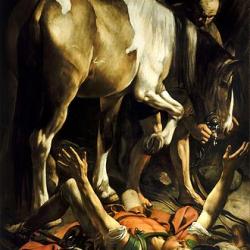Once a monarch, or a leader of any sort, becomes convinced that his or her desires are always the desires of God, tyranny cannot be far behind. The David that we met in 2 Samuel 11, who shattered four of the Ten Commandments—killing, coveting, adultery, and false witness—had become convinced that what he wanted, God wanted, too. How wrong he was is made clear by Nathan, who shouted that "he (David) was the man" who had done all this evil.
"But the godless (or 'worthlessness') are like thorns thrown away, so useless that no hand will pick them up. One can only touch them with an iron bar or a spear shaft, for they are completely consumed in fire right where they are" (2 Sam. 23:6-7). As one often finds in poems like this one, there is a sharp contrast at the end. Unlike the righteous and God-fearing king who spends his days saving the poor and working on behalf of all the people, godless ones are completely expendable, worse than useless. They are no better than "thorns," thoughtlessly tossed aside. No sane person would even bother to handle them. They might just poke them with a spear shaft, for they are only good for a quick and useless fire, immediately consumed and offering little heat or light.
This figure is reminiscent of the parable of the bramble bush in Judges 9:7-15 where the would-be king, Abimelech, is likened to a useless bramble bush, good only for a quick fire and providing no shade at all. Abimelech is the godless thorn, completely unlike the wonderful David who is everything that a king should be, according to our poet.
Well, this propagandistic portrait of Israel's second king is not all that we know about David, though his memory was a grand one. After all, 1,000 years later, many people were still longing for the return of one just like him, shouting that Jesus was no less than "the son of David" (Mk. 11:10 among others). Still, the rich authors of David's vast story knew better.
Though the king of Israel should be noted by his piety and good works for his people, too often they are known as those who connect their own desires with what they imagine to be the desires of God. This was certainly true for David, and has been true for many other world leaders since his time. When we continue to ask for a "king like David" we need to be very certain exactly what it is we are asking for and be careful to evaluate just what it is we receive.





